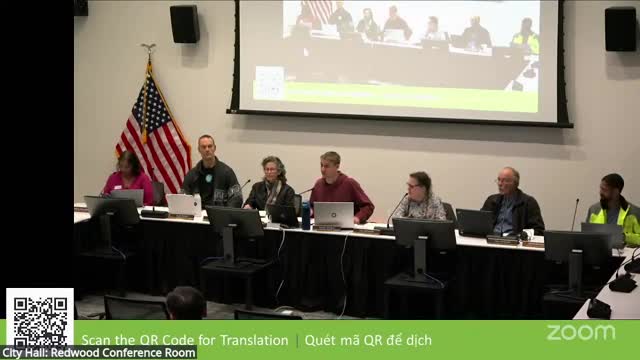Sunnyvale city manager flags federal funding uncertainty, preview of budget and library options
Get AI-powered insights, summaries, and transcripts
Subscribe
Summary
City Manager Tim Kirby introduced himself to the Bicycle & Pedestrian Advisory Commission and outlined a city budget timeline while warning of potential federal funding shifts that could affect human services and workforce programs; council work on a downsized or combined library bond was also outlined.
Tim Kirby, the city manager, introduced himself to the Bicycle & Pedestrian Advisory Commission on Feb. 20 and used the meeting to preview the city’s budget timetable and to flag federal funding risk that could affect local human services.
Kirby, who said he has worked for the city for 30 years, told commissioners the city is following a council-directed calendar that includes a strategic priority-setting session on March 13 and a recommended budget release in May, followed by public hearings and adoption in June. “We’ll be planning out all the work that we do day to day plus building in strategic priorities,” Kirby said.
Why it matters: Kirby told the commission the city is watching federal funding closely because changes could ripple to local safety-net services. “The county receives a large amount of federal funding, billions of dollars,” he said, and reductions to federal healthcare or social-service grants could affect Sunnyvale residents who use county-run clinics and other services. Kirby also flagged Community Development Block Grant (CDBG) funds, used to support local nonprofits that provide food and housing assistance, as especially vulnerable.
Kirby ran through specific federal-dependent programs: NOVA Workforce Services — a regional workforce board that receives about $9–10 million a year in federal funding — and the Sunnyvale Clean Water Program, which has more than $500 million in executed loans for the city’s sewage-plant renovation. He said the federal support for those large, executed contracts is not currently at risk but remains under watch.
On local priorities and staffing, Kirby said roughly two-thirds of city operating costs (excluding wholesale water, landfill, and major vendor contracts) are staff costs. He described the city’s use of consultants as a way to access specialized skills or to complete projects when staffing levels are full. ‘‘Consultants are used in a lot of different ways,’’ he said, and sometimes ‘‘we use consultants because we don’t have the expertise on staff.’’ Kirby said the city has started slowly growing staff after two decades of flat staffing, adding roughly 30 positions across departments in the past year.
Library and civic center: Kirby said the council is still evaluating options after voters rejected a previous library bond. Options under consideration include downsizing the library project and returning to the voters, reconfiguring service delivery with more branch work, or bundling the library with other civic needs (for example, public safety) to attract broader support. He said basic repairs to the existing library’s plumbing and facilities are planned while longer-term options are considered.
Local projects referenced: Kirby and commissioners discussed Fair Oaks Avenue safety and a council colleague’s memo that would allow consideration of removing street parking for active-transportation upgrades. Councilmember Mellinger, who attended the BPAC meeting, has pushed for smaller, faster signal or intersection upgrades along Fair Oaks as an interim safety step while larger “complete streets” work is evaluated.
What’s next: Kirby reiterated the calendar: strategic priority-setting in mid-March, a budget workshop in May, public hearings in June and budget adoption by charter deadline in June. He said staff will present specific proposals for council consideration and encouraged commissioners to raise questions as projects move toward design and funding.
Ending: Kirby closed by saying the manager’s recommended budget would reflect both the city’s ongoing, day-to-day work and the council’s strategic priorities, and that staff will monitor federal funding developments as they prepare the recommended budget.
